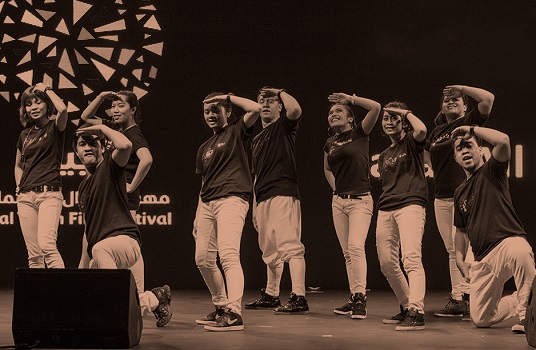Youth Acting Workshop
Youth Acting Workshop

How do we access creativity? How we manage to forget who we are and project ourselves into the skin of another person? These are some of the questions that inform this workshop.
The class teaches acting through improvisation, which encourages the students to play in public without a predefined text or prior direction. Improvisation helps students develop creativity and listening skills, inspiring them to imagine and to share.
Improvisation also makes the actor conscious of the body and its movements. For this reason, the first half hour of each session is dedicated to body work, relaxation, breathing peripheral balance and breathing.
The remainder of each session focuses on to individual and group improvisation exercises that expose participants to situations that will help them get outside themselves, free to touch the truth that is camouflaged by the everyday.
Age groups: 8 to 12 and 13 to 17 years old
The workshop runs from 10 October through 23 November. There are two two-hour sessions per week, on Monday and Wednesday evenings.
Sessions for 8- to 12-year-olds are held from 3:00 to 5:00 PM.
Sessions for 13- to 17-year-olds are held from 5:00 to 7:00 PM.
Week 1: 10 and 12 October
Week 2: 17 and 19 October
Week 3: 24 and 26 October
Week 4: Sessions on 31 October and 2 November are respectively rescheduled to 19 November, 3:00 to 7:00 PM, and 26 November, 3:00 to 5:00 PM.
Week 5: 7 and 9 November
Week 6: 14 and 16 November
Week 7: 21 and 23 November
Price
1,000.00 QAR for the seven-week workshop. There are two two-hour sessions per week.
SESSION OUTLINE
Week 1 and Week 2: Making contact
Focus on finding out about others and make oneself known. Participants work in pairs with the mirror exercise to break down barriers. With contact made and barriers lowered, the stage exercise starts to develop an understanding of space.
Week 3 and Week 4: The voice, concentration, acting with objects
Using and controlling the voice is a crucial part of acting. Here, participants work as a group to create harmony through variations in sound and the use of the voice, then move on to exercises in concentration and working with objects – for example, dancing with a chair as a partner.
Week 5 and Week 6: Liberation exercises
The laughter exercise allows work on various registers (sad, happy, nervous etc.) and the vocal range, while at the same time bringing about the natural freedom that comes from amusement. Similarly, the exercise of the word uses a word, pronounced with different intonations to navigate from one emotion to another.
Week 7: Improvisation and performance preparation
After a week’s break, during which participants will have time to absorb all the information the first sessions exposed them to, we focus on improvisation exercises, including the exercise of the lift, in which participants imagine how they would behave if stuck in an elevator.
Email youth@dohafilminstitute.com for further inquiries.
Mentors
Afef Ben Mahmoud

Tunisian director and actress Afef Ben Mahmoud began an artistic career at the age of 12, when she joined theatre clubs; the same year, she won her first Best Comedian Award.
At 14 she joined the Sihem Belkhodja Contemporary Dance Company, where she was trained by well-known choreographers, including Stephanie Nataf and Selma and Sofiane Ouissi. She toured Tunisia and Europe with numerous shows, then, at 17, under Belkhodja’s supervision, Ben Mahmoud ran the Tunisian National Ballet for Kids, where she gave dance courses, and created and directed performances.
For several years, she danced in musical shows by Tunisian theatre director Fadhel Jaziri, co-founder of the renowned Nouveau Théâtre de Tunis. At 20, she co-directed for Jaziri the dance ensemble in his major show ‘El Hadra’, and was selected to be part of ‘The Actor Studio’, run by renowned theatre director Fadhel Jaibi. She had her first international role in ‘Les Bacchantes’, with which she toured for three years with the French company La tour de Babel. In Tunisia, she had lead roles in Zahira Ben Ammar’s 'Trectic’ and ‘Al Moutachaâbitoune’ by Mohamed Idriss, then also the director of The Tunisian National Theatre.
Ben Mahmoud then dedicated herself to her acting and filmmaking career. Her television series credits include ‘Ya Zahratan Fi Khayali’, ‘Sayd El Rim’, ‘Maktoub…’ and numerous video clips, including ‘Madinat Al Hob’ with Kadhim Al-Sahir. She had her first big-screen role in Jilani Saâdi’s ‘Khorma’, participated in several Italian productions, and played the lead in Ibrahim Letaief’s ‘Flous Academy’ and Nouri Bouzid’s ‘Making Off’, which won awards at several international film festivals. She has directed three short narrative films and a documentary, and is currently developing her first feature-length film, ‘Backstage’.
Ben Mahmoud holds a B.Sc in Economics and Management, a BFA in Film Directing and Screenwriting and an MA in Art and Design.